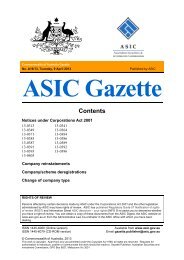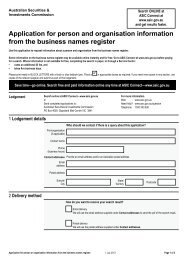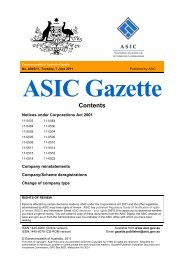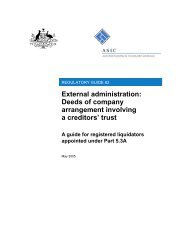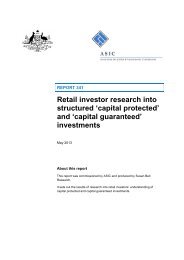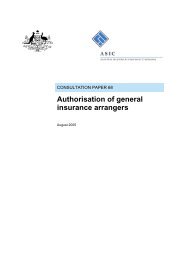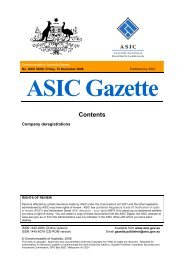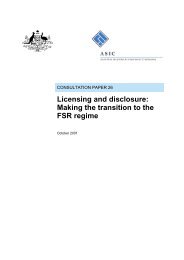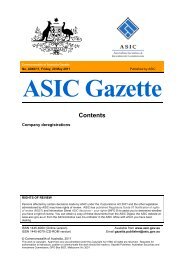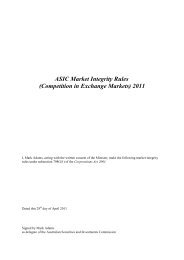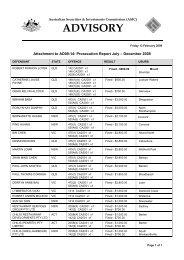If you provide a financial service to a retail client via an intermediary ...
If you provide a financial service to a retail client via an intermediary ...
If you provide a financial service to a retail client via an intermediary ...
Create successful ePaper yourself
Turn your PDF publications into a flip-book with our unique Google optimized e-Paper software.
Guid<strong>an</strong>ce referred <strong>to</strong> in ASIC Information Release 04-78<br />
<strong>If</strong> <strong>you</strong> <strong>provide</strong> a <strong>fin<strong>an</strong>cial</strong> <strong>service</strong> <strong>to</strong> a <strong>retail</strong> <strong>client</strong> <strong>via</strong><br />
<strong>an</strong> <strong>intermediary</strong> (a secondary <strong>service</strong>) is the <strong>service</strong><br />
caught by the <strong>retail</strong> <strong>client</strong> requirements?<br />
Answer<br />
Yes, <strong>you</strong>r <strong>service</strong> may be caught by the <strong>retail</strong> <strong>client</strong> requirements. This FAQ<br />
explains when <strong>you</strong> will be caught by the <strong>retail</strong> <strong>client</strong> requirements <strong>an</strong>d what <strong>you</strong> c<strong>an</strong><br />
do <strong>to</strong> avoid them. It also tells <strong>you</strong> what relief is available <strong>to</strong> assist <strong>you</strong> <strong>to</strong> meet <strong>you</strong>r<br />
obligation <strong>to</strong> give the <strong>retail</strong> <strong>client</strong> <strong>you</strong>r FSG.<br />
What is a 'secondary <strong>service</strong>'?<br />
In this FAQ, we call a <strong>fin<strong>an</strong>cial</strong> <strong>service</strong> <strong>provide</strong>d <strong>to</strong> a <strong>retail</strong> <strong>client</strong> <strong>via</strong> <strong>an</strong> <strong>intermediary</strong> 1<br />
a ‘secondary <strong>service</strong>’.<br />
Why the need for this FAQ?<br />
We have been asked how <strong>you</strong> decide whether or not a <strong>fin<strong>an</strong>cial</strong> <strong>service</strong> is a secondary<br />
<strong>service</strong>. <strong>If</strong> the <strong>service</strong> is a secondary <strong>service</strong>, the <strong>retail</strong> <strong>client</strong> requirements of the law<br />
must be met.<br />
However, if <strong>you</strong> take reasonable steps <strong>to</strong> prevent the secondary <strong>service</strong> from<br />
occurring, <strong>you</strong> may not be required <strong>to</strong> meet the <strong>retail</strong> <strong>client</strong> requirements. This FAQ<br />
considers secondary <strong>service</strong>s when <strong>you</strong> are:<br />
1<br />
The <strong>intermediary</strong> is simply the entity through whom <strong>you</strong>r <strong>fin<strong>an</strong>cial</strong> <strong>service</strong> is made available<br />
<strong>to</strong> the <strong>retail</strong> <strong>client</strong>.
IF YOU PROVIDE A FINANCIAL SERVICE TO A RETAIL CLIENT VIA AN INTERMEDIARY (A SECONDARY<br />
SERVICE) IS THE SERVICE CAUGHT BY THE RETAIL CLIENT REQUIREMENTS?<br />
• providing <strong>fin<strong>an</strong>cial</strong> advice<br />
• dealing, or<br />
• providing a cus<strong>to</strong>dial or deposi<strong>to</strong>ry arr<strong>an</strong>gement.<br />
Concerns have been expressed <strong>to</strong> us about the difficulty in providing a Fin<strong>an</strong>cial<br />
Services Guide (FSG) <strong>to</strong> a <strong>retail</strong> <strong>client</strong> where the licensee providing the secondary<br />
<strong>service</strong> does not have a direct relationship with that <strong>retail</strong> <strong>client</strong>. This FAQ lists a<br />
number of ways in which these practical difficulties could be resolved.<br />
The <strong>intermediary</strong> should also consider whether they are providing a <strong>fin<strong>an</strong>cial</strong> <strong>service</strong><br />
<strong>to</strong> <strong>retail</strong> <strong>client</strong>s. The fact that <strong>an</strong> entity <strong>provide</strong>s a secondary <strong>service</strong> <strong>to</strong> a <strong>retail</strong> <strong>client</strong><br />
does not affect the question of whether the <strong>intermediary</strong> also <strong>provide</strong>s a <strong>fin<strong>an</strong>cial</strong><br />
<strong>service</strong> <strong>to</strong> the <strong>retail</strong> <strong>client</strong>.<br />
What are the <strong>retail</strong> <strong>client</strong> requirements?<br />
<strong>If</strong> <strong>you</strong> <strong>provide</strong> a secondary <strong>service</strong> <strong>to</strong> a <strong>retail</strong> <strong>client</strong>, <strong>you</strong> may need <strong>to</strong>:<br />
• have <strong>an</strong> appropriate <strong>retail</strong> Australi<strong>an</strong> <strong>fin<strong>an</strong>cial</strong> <strong>service</strong>s (AFS) licence<br />
authorisation<br />
• have appropriate dispute resolution processes<br />
• <strong>provide</strong> <strong>an</strong> FSG about the <strong>service</strong> <strong>you</strong> are providing<br />
• follow Policy Statement 146 Licensing: Training of <strong>fin<strong>an</strong>cial</strong> product<br />
advisers [PS 146] <strong>an</strong>d related training requirements if advice is <strong>provide</strong>d,<br />
<strong>an</strong>d<br />
• satisfy general advice warning requirements if general advice is <strong>provide</strong>d.<br />
When is <strong>fin<strong>an</strong>cial</strong> product advice a secondary <strong>service</strong>?<br />
Your <strong>fin<strong>an</strong>cial</strong> product advice is a secondary <strong>service</strong> if, subject <strong>to</strong> <strong>an</strong>y other<br />
exemptions that may apply (such as in regulation 7.1.33B), <strong>you</strong> cause or authorise<br />
<strong>fin<strong>an</strong>cial</strong> product advice <strong>to</strong> be given or directed <strong>to</strong> a <strong>retail</strong> <strong>client</strong> (within the me<strong>an</strong>ing<br />
of s52).<br />
Causing or authorising doesn’t always need <strong>to</strong> be express. Therefore, <strong>you</strong> are likely <strong>to</strong><br />
be providing a secondary <strong>service</strong> if:<br />
• <strong>you</strong> know (or should know) that the advice or <strong>an</strong>y part of it will be passed<br />
on <strong>to</strong> a third party (the recipient); <strong>an</strong>d<br />
• the advice is passed on <strong>an</strong>d attributed <strong>to</strong> <strong>you</strong>.<br />
©Australi<strong>an</strong> Securities & Investments Commission, December 2004 2
IF YOU PROVIDE A FINANCIAL SERVICE TO A RETAIL CLIENT VIA AN INTERMEDIARY (A SECONDARY<br />
SERVICE) IS THE SERVICE CAUGHT BY THE RETAIL CLIENT REQUIREMENTS?<br />
However, <strong>you</strong> do not authorise the provision of advice by mere inactivity if <strong>you</strong> did<br />
not know or have reason <strong>to</strong> suspect that the advice might be passed on <strong>an</strong>d attributed<br />
<strong>to</strong> <strong>you</strong> (University of New South Wales v Moorhouse & Angus & Robertson<br />
(Publishers) Pty Ltd (1975) 133 CLR 1 at pp 12–14 per Gibbs J).<br />
In addition, if the <strong>intermediary</strong> <strong>provide</strong>s <strong>fin<strong>an</strong>cial</strong> product advice <strong>to</strong> the <strong>retail</strong> <strong>client</strong> as<br />
its own, without attributing it <strong>to</strong> <strong>you</strong>, it will not be <strong>fin<strong>an</strong>cial</strong> product advice <strong>provide</strong>d<br />
by <strong>you</strong> <strong>to</strong> the <strong>retail</strong> <strong>client</strong>. This is the case even if the advice <strong>provide</strong>d by <strong>you</strong> <strong>to</strong> the<br />
<strong>intermediary</strong> helped that <strong>intermediary</strong> <strong>to</strong> formulate its own advice.<br />
When is <strong>fin<strong>an</strong>cial</strong> product advice not a secondary <strong>service</strong>?<br />
<strong>If</strong> <strong>you</strong> meet all of the following three requirements we would ordinarily expect that<br />
<strong>you</strong> would not be providing <strong>fin<strong>an</strong>cial</strong> product advice <strong>to</strong> a <strong>retail</strong> <strong>client</strong>, even if <strong>you</strong>r<br />
advice is later passed on <strong>to</strong> them <strong>an</strong>d attributed <strong>to</strong> <strong>you</strong>:<br />
• Requirement 1: You expressly prohibit the <strong>intermediary</strong> (i.e. <strong>you</strong>r<br />
wholesale <strong>client</strong>) from passing on <strong>you</strong>r advice <strong>to</strong> <strong>an</strong>y <strong>retail</strong> <strong>client</strong>.<br />
• Requirement 2: You include a prominent statement in <strong>you</strong>r advice <strong>to</strong> the<br />
<strong>intermediary</strong> that it is only intended for use by wholesale <strong>client</strong>s <strong>an</strong>d must<br />
not be made available <strong>to</strong> <strong>an</strong>y <strong>retail</strong> <strong>client</strong>.<br />
• Requirement 3: There is no reasonable basis <strong>to</strong> believe that the<br />
<strong>intermediary</strong> will fail <strong>to</strong> comply with <strong>you</strong>r express prohibition in<br />
Requirement 1.<br />
Meeting these three requirements should amount <strong>to</strong> reasonable steps <strong>to</strong> prevent the<br />
secondary <strong>service</strong> from occurring. As a result, it is our view that <strong>you</strong> ordinarily would<br />
not be considered <strong>to</strong> be causing or authorising either directly or implicitly the giving<br />
or directing (dissemination) of <strong>you</strong>r advice <strong>to</strong> <strong>retail</strong> <strong>client</strong>s <strong>via</strong> the <strong>intermediary</strong>.<br />
When is there no reasonable opportunity <strong>to</strong> give <strong>an</strong> FSG?<br />
Although s940B exempts a person providing <strong>fin<strong>an</strong>cial</strong> <strong>service</strong>s from having <strong>to</strong> <strong>provide</strong><br />
<strong>an</strong> FSG where there is ‘no reasonable opportunity’, this exemption would not usually<br />
apply <strong>to</strong> secondary <strong>service</strong>s. This is because <strong>you</strong> could obtain the contact details of the<br />
<strong>retail</strong> <strong>client</strong> from the <strong>intermediary</strong>.<br />
Example 1<br />
A <strong>fin<strong>an</strong>cial</strong> pl<strong>an</strong>ner seeks advice from a s<strong>to</strong>ckbroker about what share purchases<br />
should be made for a particular <strong>retail</strong> <strong>client</strong>. What c<strong>an</strong> the s<strong>to</strong>ckbroker do <strong>to</strong> ensure<br />
that they do not <strong>provide</strong> a secondary <strong>service</strong> <strong>to</strong> the <strong>retail</strong> <strong>client</strong>?<br />
ASIC comment: The s<strong>to</strong>ckbroker could give advice <strong>to</strong> the <strong>fin<strong>an</strong>cial</strong> pl<strong>an</strong>ner taking<br />
reasonable steps <strong>to</strong> prevent it from being passed on <strong>to</strong> the <strong>retail</strong> <strong>client</strong> as the<br />
s<strong>to</strong>ckbroker’s advice. The s<strong>to</strong>ckbroker could achieve this by meeting the three<br />
requirements listed above.<br />
©Australi<strong>an</strong> Securities & Investments Commission, December 2004 3
IF YOU PROVIDE A FINANCIAL SERVICE TO A RETAIL CLIENT VIA AN INTERMEDIARY (A SECONDARY<br />
SERVICE) IS THE SERVICE CAUGHT BY THE RETAIL CLIENT REQUIREMENTS?<br />
The <strong>fin<strong>an</strong>cial</strong> pl<strong>an</strong>ner could then formulate their own advice taking in<strong>to</strong> account what<br />
the s<strong>to</strong>ckbroker has said.<br />
Alternatively, if the s<strong>to</strong>ckbroker allows the <strong>fin<strong>an</strong>cial</strong> pl<strong>an</strong>ner <strong>to</strong> pass on the<br />
s<strong>to</strong>ckbroker’s advice <strong>to</strong> the <strong>retail</strong> <strong>client</strong> the s<strong>to</strong>ckbroker would need <strong>to</strong> meet all the<br />
<strong>retail</strong> <strong>client</strong> requirements, including arr<strong>an</strong>ging for <strong>an</strong> FSG <strong>to</strong> be <strong>provide</strong>d by the<br />
<strong>fin<strong>an</strong>cial</strong> pl<strong>an</strong>ner <strong>to</strong> the <strong>retail</strong> <strong>client</strong> on their behalf. This would be necessary because<br />
by allowing the <strong>fin<strong>an</strong>cial</strong> pl<strong>an</strong>ner <strong>to</strong> pass on their advice, the s<strong>to</strong>ckbroker is providing<br />
a secondary <strong>service</strong> <strong>to</strong> the <strong>retail</strong> <strong>client</strong>.<br />
However, if the advice is not attributed <strong>to</strong> the s<strong>to</strong>ckbroker, the s<strong>to</strong>ckbroker will not be<br />
providing a secondary <strong>service</strong> <strong>to</strong> the <strong>retail</strong> <strong>client</strong> <strong>an</strong>d will not be obliged <strong>to</strong> give their<br />
FSG <strong>to</strong> that <strong>retail</strong> <strong>client</strong>.<br />
Example 2<br />
A general insur<strong>an</strong>ce broker discusses particular details of the insur<strong>an</strong>ce needs of their<br />
<strong>retail</strong> <strong>client</strong>s with <strong>an</strong> underwriting agency. The general insur<strong>an</strong>ce broker then asks the<br />
underwriting agency what particular products the underwriting agency might<br />
recommend for those <strong>client</strong>s’ circumst<strong>an</strong>ces.<br />
ASIC comment: The underwriting agency could avoid providing a secondary <strong>service</strong> <strong>to</strong><br />
the <strong>retail</strong> <strong>client</strong>s by taking the three reasonable steps listed above. The general<br />
insur<strong>an</strong>ce broker could then formulate their own advice taking in<strong>to</strong> account what the<br />
underwriting agency has said.<br />
Alternatively, if the underwriting agency allows the general insur<strong>an</strong>ce broker <strong>to</strong> pass<br />
on the underwriting agency’s advice <strong>to</strong> the <strong>retail</strong> <strong>client</strong> the underwriting agency would<br />
need <strong>to</strong> meet all the <strong>retail</strong> <strong>client</strong> requirements, including arr<strong>an</strong>ging for <strong>an</strong> FSG <strong>to</strong> be<br />
<strong>provide</strong>d by the general insur<strong>an</strong>ce broker <strong>to</strong> the <strong>retail</strong> <strong>client</strong> on their behalf. This would<br />
be necessary because by allowing the general insur<strong>an</strong>ce broker <strong>to</strong> pass on their advice,<br />
the underwriting agency is providing a secondary <strong>service</strong> <strong>to</strong> the <strong>retail</strong> <strong>client</strong>.<br />
However, if the advice is not attributed <strong>to</strong> the underwriting agency, the underwriting<br />
agency will not be providing a secondary <strong>service</strong> <strong>to</strong> the <strong>retail</strong> <strong>client</strong> <strong>an</strong>d not be obliged<br />
<strong>to</strong> give their FSG <strong>to</strong> that <strong>retail</strong> <strong>client</strong>.<br />
©Australi<strong>an</strong> Securities & Investments Commission, December 2004 4
IF YOU PROVIDE A FINANCIAL SERVICE TO A RETAIL CLIENT VIA AN INTERMEDIARY (A SECONDARY<br />
SERVICE) IS THE SERVICE CAUGHT BY THE RETAIL CLIENT REQUIREMENTS?<br />
Example 3<br />
A research house issues a piece of research that includes general <strong>fin<strong>an</strong>cial</strong> product<br />
advice <strong>to</strong> its various licensee <strong>client</strong>s. The licensee <strong>client</strong>s post that research on their<br />
websites in a location that c<strong>an</strong> be accessed by their <strong>retail</strong> <strong>client</strong>s with <strong>an</strong><br />
acknowledgment of the source of the research.<br />
ASIC comment: Unless the research house has taken reasonable steps <strong>to</strong> prevent their<br />
advice being passed on <strong>to</strong> <strong>retail</strong> <strong>client</strong>s (such as the three reasonable steps listed<br />
above), they are likely <strong>to</strong> be providing <strong>fin<strong>an</strong>cial</strong> product advice <strong>to</strong> the <strong>retail</strong> <strong>client</strong>s by<br />
implicitly causing or authorising the provision of their advice <strong>to</strong> the <strong>retail</strong> <strong>client</strong>s <strong>an</strong>d<br />
would need <strong>to</strong> meet all of the <strong>retail</strong> <strong>client</strong> requirements.<br />
<strong>If</strong> the research house allows the licensee <strong>client</strong>s <strong>to</strong> pass on the research house’s advice<br />
<strong>to</strong> the <strong>retail</strong> <strong>client</strong> the research house would need <strong>to</strong> meet all the <strong>retail</strong> <strong>client</strong><br />
requirements, including arr<strong>an</strong>ging for <strong>an</strong> FSG <strong>to</strong> be <strong>provide</strong>d by the licensee <strong>client</strong>s <strong>to</strong><br />
the <strong>retail</strong> <strong>client</strong> on their behalf. This would be necessary because by allowing the<br />
licensee <strong>client</strong>s <strong>to</strong> pass on their advice, the research house is providing a secondary<br />
<strong>service</strong> <strong>to</strong> the <strong>retail</strong> <strong>client</strong>.<br />
Example 4<br />
A research house issues a piece of research that includes general <strong>fin<strong>an</strong>cial</strong> product<br />
advice <strong>an</strong>d posts this on its website, which is accessible by the public. A licensee takes<br />
the information from the website <strong>an</strong>d passes that information on <strong>to</strong> its <strong>retail</strong> <strong>client</strong>s as<br />
the research house’s advice. The research house has no agreement or relationship with<br />
the licensee, <strong>an</strong>d does not know the identity of the <strong>client</strong>s of the licensee.<br />
ASIC comment: The research house will be providing the licensee with general<br />
<strong>fin<strong>an</strong>cial</strong> product advice. Although the research house may also be providing general<br />
advice <strong>to</strong> <strong>retail</strong> <strong>client</strong>s of the licensee, the research house will not be required <strong>to</strong> give<br />
those <strong>client</strong>s a copy of its FSG if s940B applies. This is because s940B <strong>provide</strong>s that<br />
no breach occurs where there is ‘no reasonable opportunity’ <strong>to</strong> <strong>provide</strong> <strong>retail</strong> <strong>client</strong>s<br />
with <strong>an</strong> FSG. This defence is likely <strong>to</strong> be available in this example because, in the<br />
circumst<strong>an</strong>ces described, the research house does not know, <strong>an</strong>d has no reasonable<br />
way of finding out, the identities or the addresses of the <strong>retail</strong> <strong>client</strong>s receiving the<br />
information taken <strong>an</strong>d disseminated by the licensee.<br />
©Australi<strong>an</strong> Securities & Investments Commission, December 2004 5
IF YOU PROVIDE A FINANCIAL SERVICE TO A RETAIL CLIENT VIA AN INTERMEDIARY (A SECONDARY<br />
SERVICE) IS THE SERVICE CAUGHT BY THE RETAIL CLIENT REQUIREMENTS?<br />
Example 5<br />
An expert <strong>provide</strong>s <strong>an</strong> expert's report <strong>to</strong> a <strong>client</strong> for inclusion in the <strong>client</strong>'s PDS (or<br />
prospectus), which will be circulated <strong>to</strong> <strong>retail</strong> <strong>client</strong>s.<br />
ASIC comment: The expert must meet all of the <strong>retail</strong> <strong>client</strong> requirements including<br />
having <strong>an</strong> appropriate <strong>retail</strong> Australi<strong>an</strong> <strong>fin<strong>an</strong>cial</strong> <strong>service</strong>s licence authorisation <strong>an</strong>d<br />
giving its FSG <strong>to</strong> the <strong>retail</strong> <strong>client</strong>s <strong>to</strong> whom its <strong>client</strong> gives its PDS (or prospectus).<br />
When is dealing a secondary <strong>service</strong>?<br />
<strong>If</strong> <strong>you</strong> are dealing (s766C) because <strong>you</strong> issue a <strong>fin<strong>an</strong>cial</strong> product, the person acquiring<br />
the <strong>fin<strong>an</strong>cial</strong> product is <strong>you</strong>r <strong>client</strong>. In circumst<strong>an</strong>ces where <strong>you</strong> are dealing by<br />
applying for, acquiring, varying or disposing of a <strong>fin<strong>an</strong>cial</strong> product on behalf of <strong>retail</strong><br />
<strong>client</strong>s <strong>via</strong> <strong>an</strong> <strong>intermediary</strong>, the <strong>retail</strong> <strong>client</strong> will be <strong>you</strong>r <strong>client</strong>. As this is a secondary<br />
<strong>service</strong>, <strong>you</strong> must meet the <strong>retail</strong> <strong>client</strong> requirements of the law.<br />
Similarly, where the <strong>intermediary</strong> is <strong>an</strong> agent for a <strong>retail</strong> <strong>client</strong>, the <strong>retail</strong> <strong>client</strong> will be<br />
<strong>you</strong>r <strong>client</strong> <strong>an</strong>d <strong>you</strong> will <strong>provide</strong> a <strong>fin<strong>an</strong>cial</strong> <strong>service</strong> <strong>to</strong> that <strong>retail</strong> <strong>client</strong>.<br />
When is dealing not a secondary <strong>service</strong>?<br />
<strong>If</strong> the <strong>intermediary</strong> is the agent of a <strong>retail</strong> <strong>client</strong>, but contracts in terms that imply that<br />
they are the principal, <strong>you</strong> c<strong>an</strong> ordinarily treat the <strong>intermediary</strong> as the principal<br />
without inquiring further.<br />
You will not <strong>provide</strong> a <strong>fin<strong>an</strong>cial</strong> <strong>service</strong> <strong>to</strong> the <strong>retail</strong> <strong>client</strong> <strong>an</strong>d do not need <strong>to</strong> treat the<br />
<strong>retail</strong> <strong>client</strong> of the <strong>intermediary</strong> as <strong>you</strong>r <strong>client</strong> if the <strong>intermediary</strong> (or <strong>an</strong>other<br />
wholesale <strong>client</strong>) acts as principal. For example, if the tr<strong>an</strong>saction is executed in the<br />
name of a trustee or cus<strong>to</strong>di<strong>an</strong> they will be <strong>you</strong>r <strong>client</strong> <strong>an</strong>d <strong>you</strong>r obligations will be <strong>to</strong><br />
them. The nature of those obligations will depend on whether the trustee or cus<strong>to</strong>di<strong>an</strong><br />
is a wholesale or <strong>retail</strong> <strong>client</strong>.<br />
Example 6<br />
A fund m<strong>an</strong>ager in charge of a <strong>retail</strong> sub-account employs the <strong>service</strong>s of a dealer.<br />
The fund m<strong>an</strong>ager has complete control <strong>an</strong>d makes all of the day-<strong>to</strong>-day decisions on<br />
behalf of the <strong>retail</strong> <strong>client</strong> represented in the sub-account, but the <strong>retail</strong> <strong>client</strong> is the<br />
direct beneficiary of the sub-account assets. Is the dealer providing a secondary<br />
<strong>service</strong> <strong>to</strong> the <strong>retail</strong> <strong>client</strong> even though they may have no direct contact?<br />
ASIC comment: <strong>If</strong> the <strong>fin<strong>an</strong>cial</strong> products are in the name of the <strong>client</strong>, <strong>an</strong>d the contract<br />
<strong>to</strong> deal is made by the fund m<strong>an</strong>ager as agent for the <strong>client</strong>, then the <strong>fin<strong>an</strong>cial</strong> <strong>service</strong><br />
is being <strong>provide</strong>d by the dealer <strong>to</strong> the <strong>retail</strong> <strong>client</strong>. As the holder of the <strong>fin<strong>an</strong>cial</strong><br />
©Australi<strong>an</strong> Securities & Investments Commission, December 2004 6
IF YOU PROVIDE A FINANCIAL SERVICE TO A RETAIL CLIENT VIA AN INTERMEDIARY (A SECONDARY<br />
SERVICE) IS THE SERVICE CAUGHT BY THE RETAIL CLIENT REQUIREMENTS?<br />
assets, the <strong>retail</strong> <strong>client</strong> is entitled <strong>to</strong> all of the <strong>retail</strong> protections, including <strong>an</strong> FSG,<br />
from the dealer.<br />
However, if <strong>client</strong> assets are held by the fund m<strong>an</strong>ager as trustee <strong>an</strong>d the fund<br />
m<strong>an</strong>ager acts as principal in the tr<strong>an</strong>sactions, then the fund m<strong>an</strong>ager is the dealer’s<br />
<strong>client</strong>.<br />
<strong>If</strong> the fund m<strong>an</strong>ager is operating <strong>an</strong> MDA under ASIC Class Order [CO 04/194]<br />
M<strong>an</strong>aged discretionary accounts, then relief may apply from the requirement <strong>to</strong> give<br />
<strong>an</strong> FSG under paragraph 6 of that class order.<br />
Example 7<br />
A general insur<strong>an</strong>ce broker arr<strong>an</strong>ges insur<strong>an</strong>ce for their <strong>retail</strong> <strong>client</strong> through <strong>an</strong><br />
underwriting agency that acts under a binder with the insurer.<br />
ASIC comment: The general insur<strong>an</strong>ce broker is dealing by arr<strong>an</strong>ging cover for the<br />
<strong>retail</strong> <strong>client</strong>: s766C(2). The mere fact that the broker asks the underwriting agency <strong>to</strong><br />
place the cover does not me<strong>an</strong> that the underwriting agency is providing a secondary<br />
<strong>service</strong> <strong>to</strong> the broker’s <strong>retail</strong> <strong>client</strong> if the underwriting agency is acting under a binder<br />
with the insurer. However, the insurer will be providing a <strong>fin<strong>an</strong>cial</strong> <strong>service</strong> <strong>to</strong> the<br />
<strong>retail</strong> <strong>client</strong> by issuing a policy in the <strong>retail</strong> <strong>client</strong>’s name.<br />
When is a cus<strong>to</strong>dial or deposi<strong>to</strong>ry arr<strong>an</strong>gement a secondary <strong>service</strong>?<br />
<strong>If</strong> <strong>you</strong> hold <strong>fin<strong>an</strong>cial</strong> products in trust for the <strong>retail</strong> <strong>client</strong> of <strong>an</strong> <strong>intermediary</strong> (instead<br />
of in trust for the <strong>intermediary</strong>) under <strong>an</strong> arr<strong>an</strong>gement with that <strong>intermediary</strong> who has<br />
<strong>an</strong> arr<strong>an</strong>gement with the <strong>retail</strong> <strong>client</strong>, <strong>you</strong> will be providing a cus<strong>to</strong>dial or deposi<strong>to</strong>ry<br />
<strong>service</strong> <strong>to</strong> the <strong>retail</strong> <strong>client</strong>: s766E. This is, therefore, a secondary <strong>service</strong> <strong>an</strong>d <strong>you</strong> must<br />
satisfy the <strong>retail</strong> <strong>client</strong> requirements of the law. Of course, this is subject <strong>to</strong> <strong>an</strong>y other<br />
exceptions in the law that may apply.<br />
When is a cus<strong>to</strong>dial or deposi<strong>to</strong>ry arr<strong>an</strong>gement not a secondary <strong>service</strong>?<br />
By holding the <strong>fin<strong>an</strong>cial</strong> products in trust for the <strong>intermediary</strong> (instead of in trust for<br />
their <strong>retail</strong> <strong>client</strong>) <strong>you</strong> will be providing a cus<strong>to</strong>dial or deposi<strong>to</strong>ry <strong>service</strong> <strong>to</strong> the<br />
<strong>intermediary</strong>, <strong>an</strong>d not <strong>to</strong> their <strong>retail</strong> <strong>client</strong>.<br />
How c<strong>an</strong> <strong>you</strong> meet the FSG requirements if <strong>you</strong> are providing a<br />
secondary <strong>service</strong>?<br />
Concerns have been expressed <strong>to</strong> us about the difficulty in providing <strong>an</strong> FSG <strong>to</strong> a<br />
<strong>retail</strong> <strong>client</strong> where the licensee or authorised representative (the secondary <strong>service</strong><br />
<strong>provide</strong>r) does not have a direct relationship with that <strong>retail</strong> <strong>client</strong>. Depending on the<br />
©Australi<strong>an</strong> Securities & Investments Commission, December 2004 7
IF YOU PROVIDE A FINANCIAL SERVICE TO A RETAIL CLIENT VIA AN INTERMEDIARY (A SECONDARY<br />
SERVICE) IS THE SERVICE CAUGHT BY THE RETAIL CLIENT REQUIREMENTS?<br />
circumst<strong>an</strong>ces, there are a number of ways in which this practical difficulty could be<br />
resolved:<br />
1. Rely on ASIC class order relief:<br />
(a)<br />
(b)<br />
(c)<br />
General FSG relief: Relief has been gr<strong>an</strong>ted for secondary <strong>service</strong><br />
<strong>provide</strong>rs from the consequences of failing <strong>to</strong> actually <strong>provide</strong> <strong>an</strong> FSG<br />
<strong>to</strong> <strong>retail</strong> <strong>client</strong>s where they enter in<strong>to</strong> <strong>an</strong> arr<strong>an</strong>gement with the<br />
<strong>intermediary</strong> for the <strong>intermediary</strong> <strong>to</strong> give the secondary <strong>service</strong><br />
<strong>provide</strong>r's FSG <strong>to</strong> those <strong>client</strong>s <strong>an</strong>d where they have no reason <strong>to</strong><br />
believe that the <strong>intermediary</strong> will not do so. Other conditions apply.<br />
This relief applies from 1 July 2005: see [CO 04/1571] for full details<br />
of the relief.<br />
Tr<strong>an</strong>sitional FSG relief: In order <strong>to</strong> give secondary <strong>service</strong> <strong>provide</strong>rs<br />
reasonable opportunity <strong>to</strong> put in<strong>to</strong> place the arr<strong>an</strong>gements referred <strong>to</strong><br />
under our general FSG relief, relief has been gr<strong>an</strong>ted until 30 June<br />
2005 for secondary <strong>service</strong> <strong>provide</strong>rs from the consequences of failing<br />
<strong>to</strong> actually <strong>provide</strong> <strong>an</strong> FSG <strong>to</strong> <strong>retail</strong> <strong>client</strong>s where they post their FSG<br />
on their website (if they have one) <strong>an</strong>d made their FSG available <strong>to</strong><br />
persons on request. Other conditions apply. This relief applies only<br />
until 30 June 2005: see [CO 04/1571] for full details of the relief.<br />
FSG relief for experts: Relief for secondary <strong>service</strong> <strong>provide</strong>rs where<br />
they <strong>provide</strong> <strong>an</strong> expert's report that is included in a third party's<br />
disclosure document such as a prospectus or product disclosure<br />
statement (PDS). This relief enables the expert <strong>to</strong> meet its obligation <strong>to</strong><br />
give its FSG <strong>to</strong> <strong>retail</strong> <strong>client</strong>s by including the FSG as a separate <strong>an</strong>d<br />
clearly identifiable part of the expert's report. Other conditions apply:<br />
see [CO 04/1572] for full details of the relief.<br />
(d)<br />
FSG relief for arr<strong>an</strong>gers: Relief for secondary <strong>service</strong> <strong>provide</strong>rs where<br />
they make offers <strong>to</strong> people <strong>to</strong> arr<strong>an</strong>ge for the issue of <strong>fin<strong>an</strong>cial</strong> products<br />
pursu<strong>an</strong>t <strong>to</strong> <strong>an</strong> arr<strong>an</strong>gement with a product <strong>provide</strong>r as referred <strong>to</strong> in<br />
paragraph 911A(2)(b) of the Act. Where this class order applies the<br />
secondary <strong>service</strong> <strong>provide</strong>r's FSG c<strong>an</strong> be included as a separate <strong>an</strong>d<br />
clearly identifiable part of the product <strong>provide</strong>r's PDS. Other<br />
conditions apply: see [CO 04/1573] for full details of the relief.<br />
2. Arr<strong>an</strong>ge for the <strong>intermediary</strong> <strong>to</strong> give the secondary <strong>service</strong> <strong>provide</strong>r's FSG <strong>to</strong><br />
the relev<strong>an</strong>t <strong>retail</strong> <strong>client</strong>s. In this case the <strong>intermediary</strong> would be acting on the<br />
secondary <strong>service</strong> <strong>provide</strong>r's behalf. It would be up <strong>to</strong> the secondary <strong>service</strong><br />
<strong>provide</strong>r <strong>to</strong> structure its arr<strong>an</strong>gements in a way that will give it sufficient<br />
certainty that the <strong>intermediary</strong> actually <strong>provide</strong>s the FSG <strong>to</strong> the <strong>retail</strong> <strong>client</strong>s in<br />
a way that satisfies the secondary <strong>service</strong> <strong>provide</strong>r's legal obligations. <strong>If</strong> the<br />
FSG is not <strong>provide</strong>d they will have breached the law (unless they are under a<br />
mistake of fact: see s952C(2); <strong>an</strong>d s6.1 <strong>an</strong>d s9.1 of the Criminal Code); or<br />
©Australi<strong>an</strong> Securities & Investments Commission, December 2004 8
IF YOU PROVIDE A FINANCIAL SERVICE TO A RETAIL CLIENT VIA AN INTERMEDIARY (A SECONDARY<br />
SERVICE) IS THE SERVICE CAUGHT BY THE RETAIL CLIENT REQUIREMENTS?<br />
3. Structure the relationship with the <strong>intermediary</strong> in such a way that the<br />
secondary <strong>service</strong> <strong>provide</strong>r avoids providing a secondary <strong>service</strong> <strong>to</strong> a <strong>retail</strong><br />
<strong>client</strong>, which would me<strong>an</strong> that there is no obligation <strong>to</strong> <strong>provide</strong> <strong>an</strong> FSG <strong>to</strong> that<br />
person (see above for examples about how this could be achieved); or<br />
4. Include requirements in the agreement with the <strong>intermediary</strong> for the<br />
<strong>intermediary</strong> <strong>to</strong> <strong>provide</strong> the secondary <strong>service</strong> <strong>provide</strong>r with address details of<br />
the relev<strong>an</strong>t <strong>retail</strong> <strong>client</strong>s – the secondary <strong>service</strong> <strong>provide</strong>r could then <strong>provide</strong><br />
its FSG <strong>to</strong> those <strong>client</strong>s; or<br />
5. Prepare a combined FSG with the <strong>intermediary</strong> incorporating information<br />
about the <strong>fin<strong>an</strong>cial</strong> <strong>service</strong> that <strong>you</strong> each <strong>provide</strong> <strong>to</strong> the <strong>retail</strong> <strong>client</strong>. Again, the<br />
secondary <strong>service</strong> <strong>provide</strong>r will remain responsible for ensuring that the FSG<br />
is actually <strong>provide</strong>d <strong>to</strong> the <strong>retail</strong> <strong>client</strong>s in a way that satisfies their legal<br />
obligations. The ability <strong>to</strong> <strong>provide</strong> a combined FSG is described in Policy<br />
Statement 175 Licensing: Fin<strong>an</strong>cial product advisers—Conduct <strong>an</strong>d<br />
disclosure at [PS 175.48]. There is no need for the parties preparing a<br />
combined FSG <strong>to</strong> be related or part of a conglomerate.<br />
What obligations does the <strong>intermediary</strong> have?<br />
<strong>If</strong> the <strong>intermediary</strong> is also providing a <strong>fin<strong>an</strong>cial</strong> <strong>service</strong> <strong>to</strong> a <strong>retail</strong> <strong>client</strong> <strong>to</strong> whom they<br />
pass on a secondary <strong>service</strong> then they will also need <strong>to</strong> meet the <strong>retail</strong> <strong>client</strong><br />
requirements.<br />
In addition, because the <strong>intermediary</strong> bundles its <strong>fin<strong>an</strong>cial</strong> <strong>service</strong> with the secondary<br />
<strong>service</strong> <strong>provide</strong>r's <strong>fin<strong>an</strong>cial</strong> <strong>service</strong> <strong>an</strong>d then makes the bundle of <strong>service</strong>s available <strong>to</strong><br />
the <strong>retail</strong> <strong>client</strong>, we would expect that, in meeting its obligations under the law <strong>an</strong>d its<br />
licence, the <strong>intermediary</strong> would explain what <strong>service</strong>s are being <strong>provide</strong>d, who is<br />
responsible for each <strong>service</strong> <strong>an</strong>d how the <strong>retail</strong> <strong>client</strong> could contact the responsible<br />
<strong>service</strong> <strong>provide</strong>r if the <strong>client</strong> has <strong>an</strong>y questions or complaints. We would also expect<br />
the <strong>intermediary</strong> <strong>to</strong> inform their <strong>client</strong>s how <strong>to</strong> obtain <strong>an</strong> FSG from the secondary<br />
<strong>service</strong> <strong>provide</strong>r.<br />
Do <strong>you</strong> need more information?<br />
Expl<strong>an</strong>ation about how a secondary <strong>service</strong> could arise when providing advice,<br />
dealing or providing a cus<strong>to</strong>dial or deposi<strong>to</strong>ry <strong>service</strong> is also <strong>provide</strong>d in:<br />
• QFS 114: Who is my <strong>client</strong>?<br />
• QFS 7: I am a trustee or opera<strong>to</strong>r of <strong>an</strong> unregistered scheme. Do I need <strong>an</strong><br />
AFS licence for providing a cus<strong>to</strong>dial or deposi<strong>to</strong>ry <strong>service</strong>?<br />
©Australi<strong>an</strong> Securities & Investments Commission, December 2004 9



